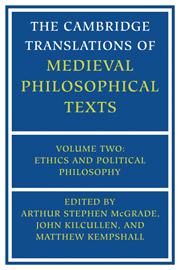Book contents
- Frontmatter
- Contents
- Preface
- General Introduction
- 1 ALBERT THE GREAT: Questions on Book X of the Ethics
- 2 BONAVENTURE: Conscience and Synderesis
- 3 GILES OF ROME: On the Rule of Princes (selections)
- 4 PETER OF AUVERGNE: Commentary and Questions on Book III of Aristotle's Politics (selections)
- 5 HENRY OF GHENT: Is It Rational for Someone without Hope of a Future Life to Choose to Die for the Commonwealth?
- 6 GODFREY OF FONTAINES: Does a Human Being Following the Dictates of Natural Reason Have to Judge that He Ought to Love God More than Himself?
- 7 JAMES OF VITERBO: Does a Human Being Have a Greater Natural Love for God than for Himself, or Vice Versa?
- 8 GODFREY OF FONTAINES: Reply to James of Viterbo on Love of God and Self
- 9 HENRY OF GHENT: Is a Subject Bound to Obey a Statute When It Is Not Evident that It Promotes the Common Utility?
- 10 GODFREY OF FONTAINES: Are Subjects Bound to Pay a Tax When the Need for It Is Not Evident?
- 11 JAMES OF VITERBO: Is It Better to Be Ruled by the Best Man than by the Best Laws?
- 12 JOHN OF NAPLES: Should a Christian King Use Unbelievers to Defend His Kingdom?
- 13 WILLIAM OF OCKHAM: Using and Enjoying
- 14 AUGUSTINE OF ANCONA: Summa on Ecclesiastical Power (selections)
- 15 WILLIAM OF OCKHAM: Is an Errant Individual Bound to Recant at the Rebuke of a Superior?
- 16 JEAN BURIDAN: Questions on Book X of the Ethics
- 17 JOHN WYCLIF: On Civil Lordship (selections)
- Index
12 - JOHN OF NAPLES: Should a Christian King Use Unbelievers to Defend His Kingdom?
Published online by Cambridge University Press: 05 June 2012
- Frontmatter
- Contents
- Preface
- General Introduction
- 1 ALBERT THE GREAT: Questions on Book X of the Ethics
- 2 BONAVENTURE: Conscience and Synderesis
- 3 GILES OF ROME: On the Rule of Princes (selections)
- 4 PETER OF AUVERGNE: Commentary and Questions on Book III of Aristotle's Politics (selections)
- 5 HENRY OF GHENT: Is It Rational for Someone without Hope of a Future Life to Choose to Die for the Commonwealth?
- 6 GODFREY OF FONTAINES: Does a Human Being Following the Dictates of Natural Reason Have to Judge that He Ought to Love God More than Himself?
- 7 JAMES OF VITERBO: Does a Human Being Have a Greater Natural Love for God than for Himself, or Vice Versa?
- 8 GODFREY OF FONTAINES: Reply to James of Viterbo on Love of God and Self
- 9 HENRY OF GHENT: Is a Subject Bound to Obey a Statute When It Is Not Evident that It Promotes the Common Utility?
- 10 GODFREY OF FONTAINES: Are Subjects Bound to Pay a Tax When the Need for It Is Not Evident?
- 11 JAMES OF VITERBO: Is It Better to Be Ruled by the Best Man than by the Best Laws?
- 12 JOHN OF NAPLES: Should a Christian King Use Unbelievers to Defend His Kingdom?
- 13 WILLIAM OF OCKHAM: Using and Enjoying
- 14 AUGUSTINE OF ANCONA: Summa on Ecclesiastical Power (selections)
- 15 WILLIAM OF OCKHAM: Is an Errant Individual Bound to Recant at the Rebuke of a Superior?
- 16 JEAN BURIDAN: Questions on Book X of the Ethics
- 17 JOHN WYCLIF: On Civil Lordship (selections)
- Index
Summary
Introduction
After teaching at the Dominican school in Naples from around 1300, John of Naples was sent to Paris in 1310 for further theological study. He was a strict adherent of Thomas Aquinas and was commissioned in 1313 (together with Pierre de la Palu) to examine the teachings of their fellow Dominican, Durand of St. Pourcain. In 1315 John became a regent master at Paris, where he taught until returning to Naples in 1317 as Dominican lector. His work survives in the form of forty-two Disputed Questions, thirteen Quodlibets, and a series of sermons. He died around 1350.
John's discussion of just war provides further illustration of the close connection between teaching within the Faculty of Theology at Paris and issues of pressing political and ecclesiological concern in western Europe. In discussing whether evil can be used for a good end, in exploring the parallel drawn by Augustine between military and legal contexts, and in expounding Aquinas's reflections on the justification of war and the legitimacy of non-Christian lordship, John makes detailed use of Scripture and of the law – canon, Roman, and customary. His conclusion is nothing if not bold: It is indeed permissible for a Christian ruler to use non-Christian mercenaries to defend a Christian commonwealth. Basing his argument on the distinction between what is true without qualification (simpliciter, per se) and what is true in certain circumstances (secundum quid), John is careful to add important practical reservations.
- Type
- Chapter
- Information
- The Cambridge Translations of Medieval Philosophical Texts , pp. 326 - 348Publisher: Cambridge University PressPrint publication year: 2000

